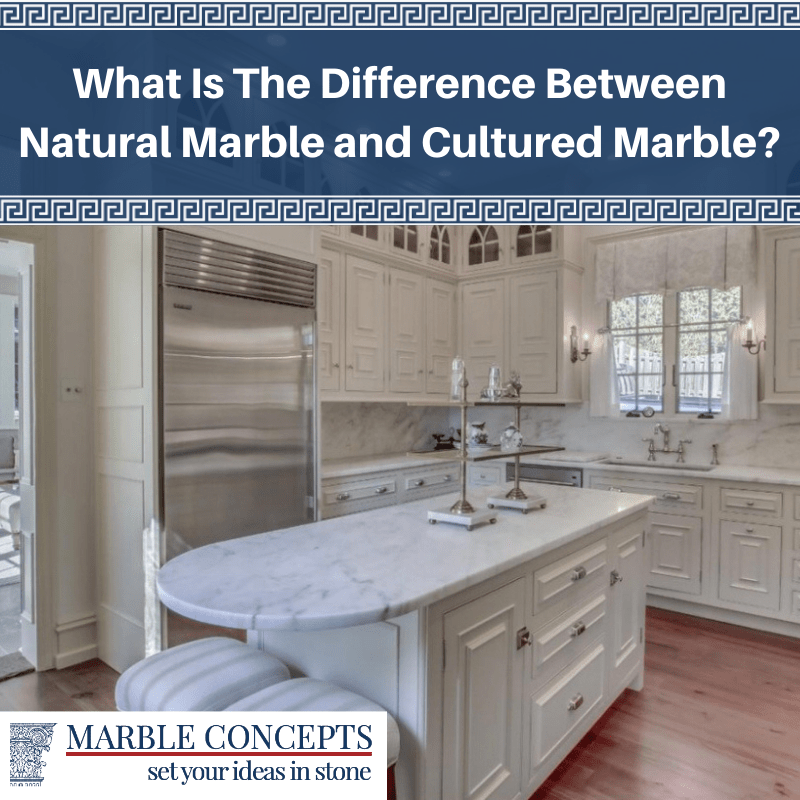There are definite differences between natural marble and cultured marble. Cultured marble is an engineered stone, but it’s related to its luxurious counterpart at the same time. Natural marble is a genuine and lustrous stone that comes from the finest quarries. You’ll see the contrasts between these two.
Choices
With marble, you have distinct choices in real marble and cultured marble. You want to think about contacting granite companies nearby to determine what’s best in marble and other materials. Consider all options for countertop selections for your kitchen, bath, and anywhere else in your home.
Natural Marble
Real marble is a costly and lavish natural stone. The term marble describes different metamorphic rocks that have similar consistencies. What designers use in homes today is natural marble that comprises calcite, dolomite or serpentine, which require polishing to achieve a glossy appearance. It’s quarried domestically as well as in different parts of the world that include Italy, Spain, India, and China. Italy boasts about being the home of beautiful white Carrara marble.
With marble being a porous material, it requires daily maintenance as it’s subject to staining, nicking, and chipping. You want to know about caring for and cleaning marble in order to maintain its lasting beauty. Natural marble also requires resealing anywhere from six months to a year from and beyond its installation.
Natural and Cultured Providers
Natural marble can carry a big price tag as extricating marble is a laborious process. Quarrying it, cutting, and shaping it is expensive. Marble’s cost will also hinge on where it comes from or where it’s quarried. There are natural marble systems throughout the United States that assist those interested in installing marble anywhere in their home.
Charges for real marble that are of a domestic origin are some less for natural marble. With Italian marble, such as Carrara and others, you are looking at more of an expense. With what’s required during the sourcing and transporting of marble, along with the labor involved with cutting and polishing it, natural marble is easily the most expensive option compared to cultured marble. Despite the price, most marble specialists consider real marble the most attractive of choices.
Cultured Marble
In dealing with cultured marble, it consists of man-made materials that contain blended natural marble that has been crushed and combined with resins and dyes that are synthetic. Though cultured marble does contain actual marble dust, it’s still considered a man-made or faux marble.
With countertop and other material formation, manufacturers fashion cultured marble within heated molds. They can make backsplashes, shower enclosures, countertops, bathtubs, sinks, showers, cabinet components, and vanities. The finished product is coated with a gel that is hard, clear, and protective. It’s applied during the manufacturing process which makes any of the materials produced great for workspaces or preparation areas. Cultured marble is left with a glossy appearance that has consistent veining and color. You could even have a custom countertop or bathroom item built to your specifications.
Advantages of Cultured Marble
The cost of cultured marble is definitely less than that of natural marble. As a manufactured material, not quarried, it’s considerably less expensive. It’s also possible to locate cultured marble that is very much like its natural marble counterpart. In fact, the way manufacturers make cultured marble is comparable to quartz and Corian products. It’s a versatile material that’s available in many distinct colors and custom colors. It’s swirled with color to create natural-looking marbling selections that include high gloss and matte finishes.
Similarities between the Two
Both natural and cultured marble are not free from the effects of scratches, cracks, searing, discolorations, and chemical damage. They’ll both require cleaning and maintenance. Repairs can happen but you’ll still want to follow cleaning standards and seek professional help when necessary. It’s always advisable to steer clear of certain chemicals and cleaners. You’ll want to use pH neutral and non-abrasive cleaners or those recommended by a marble specialist.
Though cultured marble is a durable material and its surfaces are nonporous, it has a surface that remains protected from staining and other damage. With the right care, a cultured marble surface can remain in good shape for some time; however, even with its non-porosity, you’ll still need to be careful with cultured marble as it’s subject to chipping, scratching, and excessive heat damage.
Distinguishing the Two
You can tell the difference between cultured and real marble. With cultured countertops, a combined sink and backsplash will be present and the color and pattern will be the same. Seaming and caulking will be nonexistent and its underside will be flat with edging.
With natural marble countertops, their tops or sinks will be under-mounted, which requires grout or caulk as sealing agents around the sink and backsplash area. The stone itself will be without regular veining patterns or coloring. As a natural stone, the underside will be of similar pattern and coloring.
Though stains, scratches, and burns can happen with both natural and cultured marble, either one can be rejuvenated to almost new condition with professional help.
Prices
If you choose cultured marble as opposed to natural marble, you’ll save on your renovation project. You’ll relinquish none of your design needs and stylish looks. With cultured marble, you’re still maintaining style while saving in time and costs. If you like the look of marble, cultured marble can also help you save in today’s market, as the prices can be anywhere from one-half to one-third of what you would pay for natural stone. Though it may not hold the full appeal of natural stone, the minimal differences in the two make up for the cost, plus its tough durability makes cultured marble a top contender for both interior designers and homemakers.
When you’re unsure about choosing natural or cultured marble, or have questions concerning their differences or other questions, call Marble Concepts at 215-396-7393. You’ll be glad you contacted them as they are a trusted marble authority.






